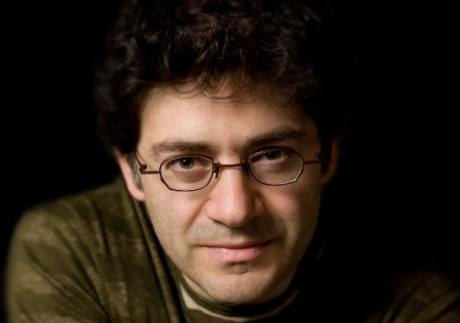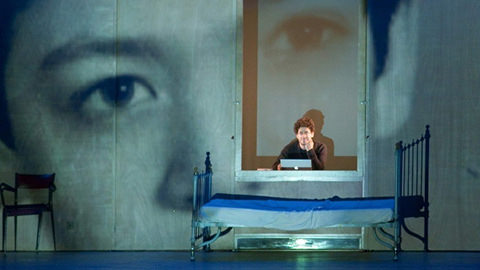To witness Seuls is to witness a gifted artist toss his tools—la vie banale, literary idols, childhood—into the same spot in a stream. Each tool, each influence, creates a new circle on the surface. Over time, these circles meet the circles of others. They overlap and blend until they become larger than themselves. Une rencontre.
Writer and Director Wajdi Mouawad opens his solo performance by blending into the real. No curtain draws back. No lights dim. Nothing signals the start of the imagined. He walks, barely clothed, into the shabby, stark apartment space already illuminated on stage; a spectator, though, seems to walk just as much into his Saturday morning. This will be a personal encounter. Spirits will be laid bare.
Mouawad—a child in Lebanon, adolescent in France, young adult in Québec, and current resident of France—addresses us in French, and will speak in Arabic. He begins by thanking those who made this rencontre (meeting, confluence) possible. Qui sommes-nous? Qui croyons-nous êtres? (Who are we? Who do we think we are?) Though seul (alone) onstage, he sees us. We have collided.
Described as semi-autobiographical (real pictures of Mouawad are projected several times, but what piece of fiction is not in some way drawn from personal experience), the story features Mouawad the man as Harwan, a thirty-five year old graduate student in Montreal drowning in a 1,500-page doctoral thesis on artist Robert Lepage. It has no conclusion, he confesses.
A phone and computer connect him to the outside world, but the weight of his task cuts Harwan off from a sense of self. On a call with a university faculty member, he repeatedly identifies himself as “the student writing on—” the title of his thesis, which is too long to be remembered or repeated. In this state of isolation, his work not only defines him, but oppresses him. When faced with a potential breakthrough, the opportunity to meet Lepage in St. Petersburg, Harwan initially shies away. To meet Lepage so soon would be like meeting “the Pope—tomorrow.”
Mouawad the director favors technology over language to convey Harwan’s state of artistic paralysis. A projection of himself, notebook in hand, watches Harwan try to write. Harwan looks out the window, toward the image, as if conscious of his own phantom. While he sleeps, that same projection shakes his bed, stabs him in the eye and pours water over his head. D’un seul coup, (all at once), Harwan awakens. Shortly after, he decides to go to St. Petersburg.
Technology is a disappointing substitute for Mouawad’s voice as a nuanced, gifted writer—but the play seems to know this. Projections of his Internet searches for a plane ticket convey little meaning, but this may be his point. In one moment, photos of him with a woman flash where we knew his window to be. Now, that window suddenly looks more like an iPhone screen. Are we looking into Harwan, really? In some ways, perhaps, but where is his voice? Who is he? His electronic devices contain personal information, but what do they communicate?
Harwan’s phone rings in the passport photo-taking booth. His father has had a stroke. Papa est dans le coma, he then explains to his sister. Hopȋtal Saint-Luc.
At long last, enter Harwan—the living, breathing Harwan. At long last, signs of life. Seated as far upstage as can be, he speaks out toward the audience—to his father, at his bedside, we understand—but of himself. Here is the window, his portrait—painted with warm words, not pixels.
Through Harwan’s voice, we see his father, who looked like an opera singer and drank coffee with his clients on the bustling streets of Beirut; we see a garden behind their house in the mountains. We learn a young Harwan slept on his favorite dog’s stomach and tried to count all the stars. We learn he painted the night sky day in and day out, that he saw concentric circles, so he wouldn’t get lost. We learn he dreamt of growing up to be une étoile filante (a shooting star).
Now, he reports to his father, wouldn’t he be proud? He’s just saved money on new wallpaper. We hear him. And it’s refreshing.
What happened to those paintings, Harwan asks, when they left Beirut? How is it, he asks, that we always bring que l’essentiel (only the essentials)? What if they had never left Lebanon? What is exile, he asks, but the impossibility de retrouver (to find, see, or meet again) a bit of time?
From here, a moment of clarity and articulation, Harwan travels to St. Petersburg and “Seuls” travels into the experimental. Harwan arrives in Russia only to find he’s packed painting supplies instead of down parkas. Que l’essentiel?
For at least twenty minutes, Harwan appears to break down. He covers himself in red paint, drags the walls of the set from here to there, sprays and smears them with various colors, stamps his own red body print three times around the window which remained constant. Birds chirp. A dog barks. In a gruesome moment, he wraps his head in cloth and cuts his eyes. Red paint leaks from them. He paints, and paints, and paints. No words.
Someone in the audience eventually cackled. It did become ridiculous at some point—absurd. Several people in the row across left the theater. A younger woman in front of me gave a skeptical glance to the man next to her.
But Harwan, from the start, seems ready to walk out on the life he is living—to leave his own performance, so much so that he imagines another life: what if he’d never left Lebanon? Later, he answers: he wouldn’t have been here saying these words.

If we focus, we could see silhouettes of ourselves in Harwan, of our own strokes of doubt, confusion, and hopelessness. Perhaps, in that cackle, in those exits, one of his silhouettes, the lost one, reflected back in us and won. The art may lie in letting art overshadow that image.
In the midst of this scene, we hear the voice of a professor. Harwan’s thesis conclusion is masterful. When did he write it? We hear the voice of his sister. Harwan, not his father, is in a coma. When did that happen? You were in an accident in a photo booth, she explains. Was Harwan ever speaking to his father? Is he in a coma now? Or, has he been in a metaphorical coma for some time?
“Seuls” leaves much to the imagination, but points to theater as the imagination’s greatest compass—because one is never seul (alone, singular masculine). The “s” in Mouawad’s title says we find direction in being alone together. On stage, it is possible to meet moments in time again and to repaint our picture of ourselves. We see Harwan, perhaps Mouawad, do so.
Running Time: 2 hours and 45 minutes, with no intermission.
Wajdi Mouawad performed the U.S. premiere of Seuls on Friday, September 18 and Saturday, September 19, 2015 at 7:30 pm in The Kennedy Center’s Eisenhower Theater – 2700 F Street, NW, in Washington, DC. Seuls was part of the World Stages Series at The Kennedy Center.





